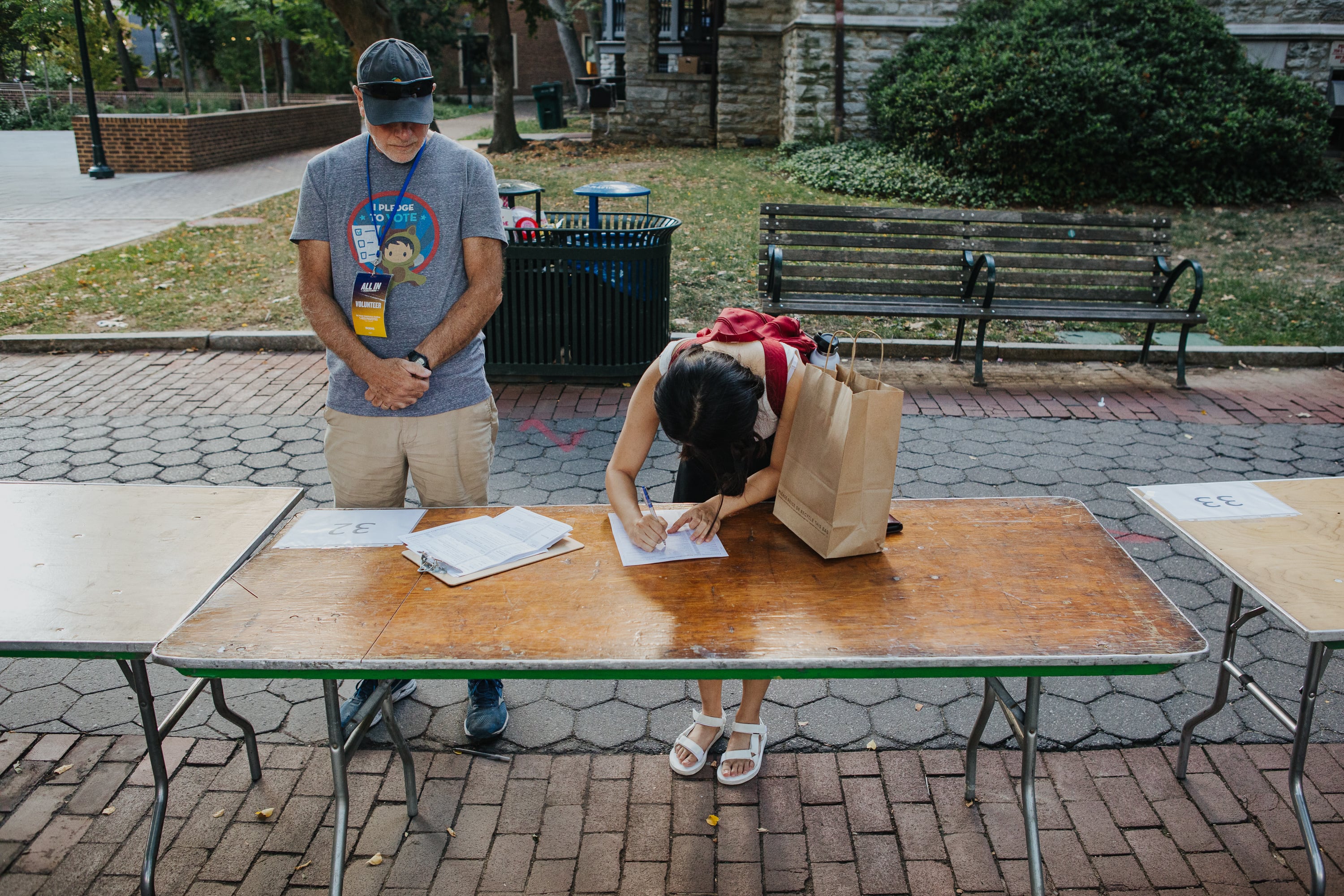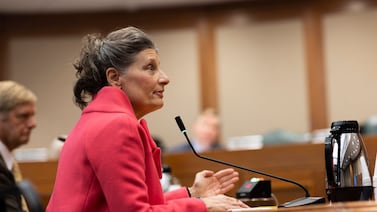Votebeat is a nonprofit news organization reporting on voting access and election administration across the U.S. Sign up for Votebeat Pennsylvania’s free newsletter here.
In the lead-up to the 2024 presidential election, workers with an Arizona-based consulting firm conducting a voter registration drive tried to submit fake registrations in Pennsylvania in an effort to earn more money, the state attorney general is alleging in a criminal complaint filed this month.
The case grew out of investigations in a few counties into voter registration applications that prosecutors had flagged as irregular before the election.
But election officials across the commonwealth say the problems with these types of third-party voter registration drives aren’t limited to this incident of alleged fraud. Rather, they say, systemic problems with the way third-party voter registration organizations operate often result in street canvassers submitting incomplete or invalid registrations.
Even when it doesn’t rise to the level of fraud, they say, the practice floods county election offices with extra work to sort through these registrations, and the problem could be mitigated via changes to state law.
Registration drives are a big source of new applications
Every presidential election year, non-governmental organizations and political parties flock to swing states like Pennsylvania to register as many voters as possible, often hiring contractors to manage the outreach to voters and employ local canvassers to collect forms. The applications they submit, several local election officials told Votebeat, can be a mixed bag.
“Some of them are valid and some of them raise red flags,” said Jim Allen, election director for Delaware County.
According to the Pennsylvania Department of State, nearly 440,000 voter registration applications came from registration drives in 2024, which represents the third-largest source of applications, behind those received through PennDOT, the state’s department of transportation, and online registrations. Roughly two-thirds of those were physical paper applications.
Those often come from canvassers whom potential voters might encounter holding clipboards outside grocery stores, shopping malls, or fairs.
Many applications collected this way turn out to be invalid, or contain incomplete information, which forces county workers to track down the applicant, election officials said. Regardless of how poorly filled out or duplicative each application is, county workers have to process each one and determine whether the individual should be added to the voter rolls. Much of that work is being done during the critical few weeks before the election, when workers also have myriad other tasks to complete.
David Voye, manager of Allegheny County’s Division of Elections, said that during a presidential election year, the county can receive a few hundred applications from voter registration drives every day.
“That’s when it becomes overwhelming for our staff members,” he said. “I would say maybe 30% are ineligible, duplicate, (or) hard to read.”
Allen said any large-scale voter registration drive brings these issues.
“They’re always well-meaning attempts to approach voters about registering to vote or for a mail-in ballot, but sometimes the language on the form or the letter can lead to issues,” he said, “or other times just human error or overzealousness can lead to an excessive number of duplicate or invalid registrations that we have to sort through.” He said he encountered similar issues at a previous election administration job in Chicago.
The applications also frequently come in large batches, as organizations submit all the registrations they have collected over several weeks. Or they arrive on the registration deadline, as was the case for those received from the group now at the center of state Attorney General Dave Sunday’s case, Arizona-based Field+Media Corps.
Complaint says canvassers were paid for collecting more forms
A big part of that case centers on a Pennsylvania law that says it is illegal to pay canvassers on the basis of how many voter registration forms they collect.
The logic behind that law is “if you offer pay per registration, it creates a perverse incentive for someone to make them up to do them faster,” said Forrest Lehman, election director in Lycoming County.
According to affidavits in criminal complaints that the attorney general filed in court in Lancaster County last week, seven people associated with Field+Media Corps last year allegedly faked information on voter registration forms in order to meet quotas for registration forms or boost their pay. The attorney general stressed that investigators found no political or partisan motive.
Investigators said canvassers received bonuses for extra applications they submitted or were threatened with termination if they didn’t gather enough, according to the criminal complaint.
One canvasser, who was not charged, told investigators that her pay reflected how many forms she collected, the attorney general alleged in court documents. For example, the documents say, she told investigators that three forms would net $40, and if a canvasser collected 15 to 16 forms in a single shift, they would be paid as if they had worked 10 hours, even if they had worked less. She also stated that canvassers could be fired if they did not meet a goal of 1.5 to two registration forms per hour.
According to the affidavits, one canvasser who was eventually fired for not meeting the quota told investigators that on some days, she would “make up names and information to meet the quota, due to fear of losing her job.”
In total, one organizer and six street canvassers were charged. No charges were brought against the company itself or executive leadership. None of the seven defendants had entered a plea as of noon Wednesday.
“We are confident that the motive behind these crimes was personal financial gain, and not a conspiracy or organized effort to tip any election for any one candidate or party,” Sunday said in a press release about the charges. “Pennsylvanians should have peace of mind that the election process worked in this case.”
The suspected fraudulent applications, in Berks, Lancaster, and York counties, were announced just before the 2024 election. At the time, county officials said no voter had been fraudulently registered.
In the affidavits, the attorney general said the forms submitted in these counties were fraudulent, and some also contained incomplete information or were duplicative.
The website and associated email accounts for Field+Media Corps, meanwhile, have been deactivated. Messages left on a number listed for the company, as well as sent to the company’s LinkedIn page, went unanswered. No response was received to an email sent to an address associated with Francisco Heredia, the Mesa, Arizona, City Council member who was listed as the company’s CEO.
Heredia last year told Votebeat and Spotlight PA that Field+Media Corps has a zero tolerance policy for workers who submit fraudulent forms, and had said the company would fully cooperate with any investigation in Pennsylvania. Court documents note the company provided “numerous records.”
How more regulation could help
Lehman said the state could help by adopting a law that makes it illegal to hold on to voter registration forms for weeks before turning them in. Field+Media Corps collected thousands of forms that it held on to for weeks, before submitting them in the final days before Pennsylvania’s voter registration deadline, according to court documents.
“Then those voters’ registrations are getting delayed, and they don’t know if they’re registered to vote until the very last minute because we’re processing all these applications,” Lehman said.
Other states already have such laws on the books.
Some counties are already trying to encourage earlier registration submissions. Centre County, home to Penn State University, adopted a policy earlier this year that, among other things, urges organizations to submit forms within 10 days of collection. A spokesperson for the county said the policy was adopted “to prevent confusion or issues with voter registration drive organizers.”
Both Voye, of Allegheny County, and Allen, of Delaware County, said they appreciated the work that third-party organizations do to try to register eligible voters, but they said these issues can cause stress for election workers, particularly in the busy few weeks leading up to Election Day.
Voye thinks the number of poor-quality forms would drop if more groups did their registrations on tablets or laptops. The Department of State has a program that allows organizations to use their own apps to submit voter registration applications directly to county election offices, so county workers don’t have to manually enter the information from paper forms. The county workers still make the final determination on who is eligible to register.
But Allen said he still sees issues with the applications coming through this system, and thinks the state should have a way for counties to see which groups are submitting bad applications, or possibly revoke their access to the program.
The access that the state offers “makes it easy for abuse, so there has to be a degree of accountability,” Allen said.
The terms of use for the program require organizations to “take all precautions to reduce and mitigate fraudulent or erroneous voter registration applications and implement measures to avoid such submissions.”
The department said that on the rare occasions when there appeared to be an issue with applications submitted by a group through the program, it suspended access “until proper quality controls were put in place.”
“There is a lot of good work that comes out of these organizations, but there is also some bad paperwork that comes out,” Allen said. “Our desire is to see them take a little more caution.”
Carter Walker is a reporter for Votebeat in partnership with Spotlight PA. Contact Carter at cwalker@votebeat.org.




